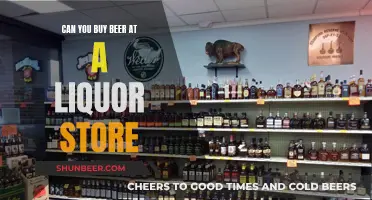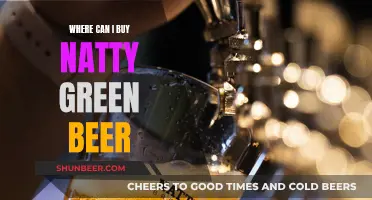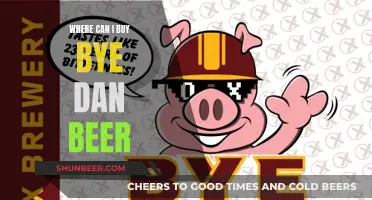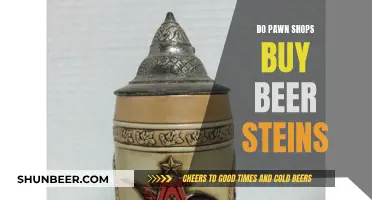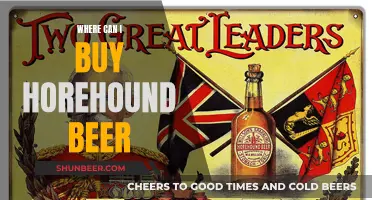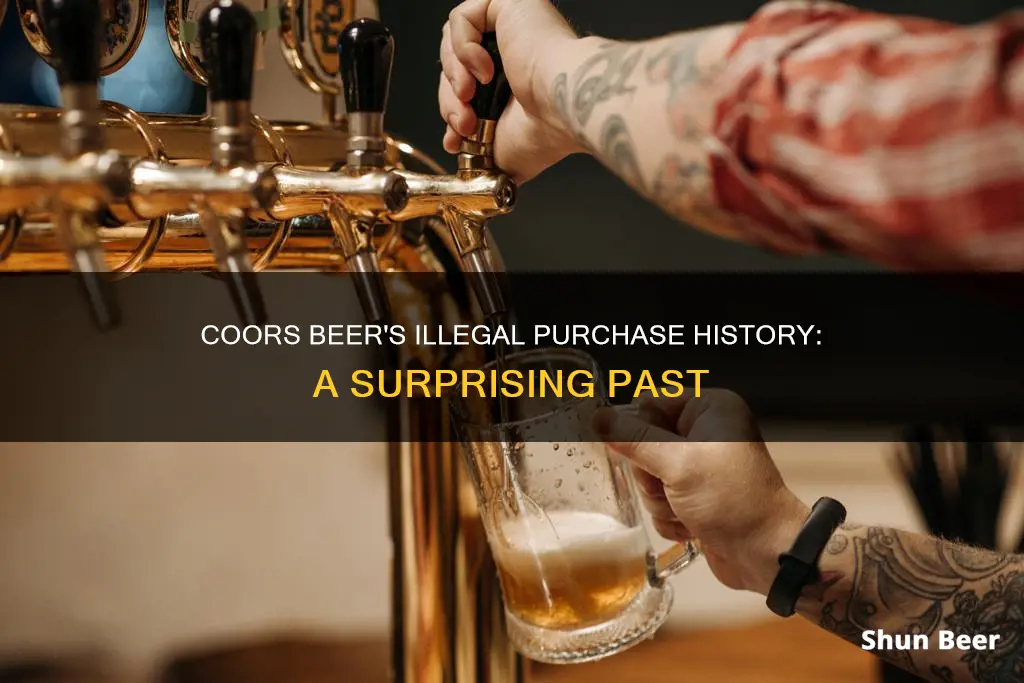
Coors beer was never illegal to buy, however, it was not sold in certain states. In the 1970s, Coors was a regional product, made in Colorado, and was not licensed to sell east of the Mississippi. This was because Coors was unpasteurized and contained no preservatives, making it difficult to ship. As a result, Coors became a rare and sought-after product in the 1970s, with people like Gerald Ford, Eisenhower, and Paul Newman hoarding it.
| Characteristics | Values |
|---|---|
| Was Coors ever illegal to buy? | No, it was not illegal to buy Coors. However, it was not distributed in certain states, making it difficult to obtain in those areas. |
| Reason for lack of distribution | Coors was a regional product that was not pasteurized and did not contain preservatives, making shipping challenging. It was produced in Colorado and was not licensed to sell east of the Mississippi River until 1986. |
| Impact of limited distribution | The limited availability of Coors in certain states created a demand for the product, and it became sought-after and smuggled into states where it was not officially distributed. |
What You'll Learn
- Coors was not sold east of Texas due to concerns about freshness during transport
- It was illegal to transport alcohol across state lines for resale without authorisation and paying taxes
- Coors was not pasteurised and did not contain preservatives, which limited its distribution
- Coors was a regional product and expanded its distribution area as demand increased
- Coors was a rare and sought-after product in the 1970s

Coors was not sold east of Texas due to concerns about freshness during transport
Coors beer was not sold east of Texas during the 1970s. This was not because of any law, but rather due to concerns about the beer's freshness during transport. Coors beer was not pasteurised and did not contain any preservatives, which meant that it had to be kept refrigerated during transit. This restricted its distribution to a few states near Colorado.
The lack of availability of Coors beer in the eastern United States made it highly desirable in that region. It was considered a chic and magic brew, and was consumed by celebrities and politicians such as Paul Newman, Gerald Ford, Eisenhower, and Henry Kissinger. Bootleggers would sell cases of Coors at a high markup in eastern states, and there was even a movie, *Smokey and the Bandit*, centred around the smuggling of Coors beer.
Coors was able to maintain its mystique and popularity despite (or perhaps because of) its limited distribution. It was the fourth-largest beer manufacturer in the United States, and had captured the number four spot in national sales with a bare minimum of paid advertising. The company had no plans to market its brand in the East, and instead focused on making the finest beer it could.
The situation changed in 1986 when Coors beer finally received national distribution. However, during the 1970s, its restricted availability created a unique culture and economy surrounding the brand.
Thanksgiving Alcohol Laws in Texas: Beer and Wine?
You may want to see also

It was illegal to transport alcohol across state lines for resale without authorisation and paying taxes
Coors beer was not illegal to buy, but it was illegal to transport across state lines for the purpose of resale without the proper authorisation and payment of taxes.
Coors was a regional product, brewed in Colorado and distributed in 11 Western states. It was not pasteurised and contained no preservatives, which meant it had to be kept refrigerated during transit. This made it difficult to distribute outside of a few states near Colorado.
However, the beer's limited availability and reputation as something unique among American beers created a demand for underground shipping. People would load up their cars on visits to the Rockies, and some even drove truckloads of Coors to sell at a high markup in states where it was not available. This was illegal because those transporting and selling the beer did not have the required authorisation and were not paying taxes on the alcohol.
It is worth noting that individuals could legally buy Coors where it was available and transport it back to their home state for personal use, as long as they paid the appropriate taxes.
Radegast Beer: Availability in the United States
You may want to see also

Coors was not pasteurised and did not contain preservatives, which limited its distribution
Coors beer was not pasteurised and did not contain preservatives, which limited its distribution. This meant that the beer had to be kept under constant refrigeration and could only be distributed to a few states near Colorado. In the 1970s, Coors was only distributed in 11 Western states and was not licensed to sell east of the Mississippi River. This was not because of specific laws against selling Coors in certain areas, but because Coors did not distribute their product in those areas. Transporting alcohol across state lines for the purpose of resale is illegal unless one is authorised to do so and pays the necessary taxes.
The lack of pasteurisation and preservatives in Coors beer was due to a decision by the company that "heat is an enemy of beer". Coors stopped pasteurising its product 18 years before 1975, instead opting to ship everything out cold and immediately. This meant that the beer consumers bought was very fresh and could be considered draft.
The limited availability of Coors beer, combined with its reputation as something unique among American beers, created a demand for underground shipping. People loaded up their cars on visits to the Rockies, and some even drove truckloads of Coors to sell at a high markup in states where it was not available. This practice of bootlegging Coors was the inspiration for the 1970s film *Smokey and the Bandit*.
Buying Beer as an Underager: A Guide
You may want to see also

Coors was a regional product and expanded its distribution area as demand increased
Coors was a regional product in the 1970s, brewed and sold in Colorado and a few other Western states. The beer was not pasteurized and contained no preservatives, so it had to be kept refrigerated during transit, limiting its distribution area.
The limited availability of Coors, combined with its reputation as something unique among American beers, created a demand for underground shipping. People would load up their cars when visiting the Rockies, and some even drove truckloads of Coors to sell at a high markup in other states. This practice of bootlegging Coors formed the plot of the 1970s film *Smokey and the Bandit*.
Coors was able to expand its distribution area as demand increased. In 1977, the company began expanding into Washington state and Missouri, and it finally received national distribution in 1986.
The restricted availability of Coors in certain states was due to a combination of factors, including the lack of pasteurization and preservatives in the beer, which limited its shelf life and transportation range, as well as the company's distribution policies and marketing strategies.
McKinney, Texas: Late-Night Beer Buying Options
You may want to see also

Coors was a rare and sought-after product in the 1970s
In the 1970s, Coors was a rare and sought-after product. The beer was only available in 11 Western states, and its limited availability, combined with its reputation as something unique among American beers, garnered a lot of fans. The fact that it was not distributed in certain states made it even more desirable in those places.
Coors was a regional product, made in Colorado, and because it was not pasteurized and contained no preservatives, shipping was tricky. As a result, it did not get national distribution until 1986. In the 1970s, it was not licensed to sell east of the Mississippi River, making it briefly a rare and sought-after product.
The beer's reputation was such that even celebrities and politicians were fans. Paul Newman, Henry Kissinger, Gerald Ford, Eisenhower, and Ronald Reagan were all said to be drinkers of Coors. Newman, the king of beer-drinking actors, was said to require Coors on ice at all his movie sets. Kissinger regularly brought cases back to Washington each time he visited California. Secret Service agents were even forbidden from bringing extra crates aboard federal planes after one agent was discovered to have loaded 38 cases onto a flight from the West Coast.
Coors's mystique was also due in part to its reputation as a high-quality beer. Company officials touted the fact that Coors used good mountain water and the most expensive brewing process in the country. The beer was also kept under constant refrigeration to ensure freshness, as it was not pasteurized.
The limited availability of Coors created a demand for underground shipping, with people loading up their cars on visits to the Rockies and even truckloads being driven to Charlotte, North Carolina, to be sold at a high markup. The beer's popularity and mystique even inspired the 1970s movie "Smokey and the Bandit," in which the plot centers on a tycoon's thirst for Coors.
Coors's rare and sought-after status in the 1970s was thus a result of a combination of factors, including its limited distribution, unique qualities, and reputation for high quality.
Where to Buy Eku Hefeweizen Beer
You may want to see also
Frequently asked questions
No, it was not illegal to buy Coors beer. However, in the 1970s, it was not available for purchase in certain states east of the Mississippi River, such as Georgia, because Coors did not have the licenses to distribute their product in those areas.
Coors was a regional product that was manufactured in Colorado. Since it was unpasteurized and contained no preservatives, it had to be kept refrigerated during transit, limiting its distribution to a few states close to Colorado.
Yes, Coors beer was smuggled to states where it was not distributed. Bootleggers would load up their cars or trucks with Coors beer and sell it at a high markup in states where it was not available.


